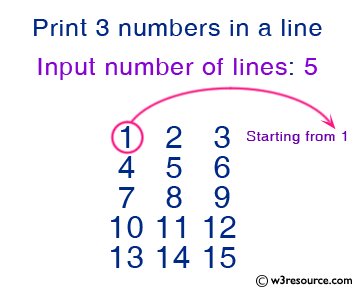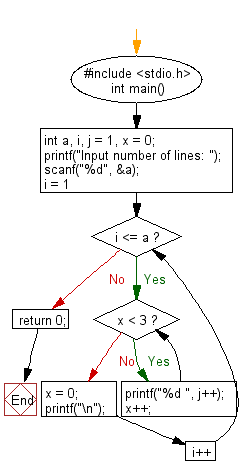C Exercises: Print 3 numbers in a line, starting from 1 and print n lines
C Basic Declarations and Expressions: Exercise-41 with Solution
Write a C program to print 3 numbers in a line, starting from 1 and print n lines. Accept number of lines (n, integer) from the user.
Pictorial Presentation:

Sample Solution:
C Code:
#include <stdio.h>
int main() {
int a, i, j = 1, x = 0;
printf("Input number of lines: ");
scanf("%d", &a);
for(i = 1; i <= a; i++) {
while(x < 3) {
printf("%d ", j++);
x++;
}
x = 0;
printf("\n");
}
return 0;
}
Sample Output:
Input number of lines: 5 1 2 3 4 5 6 7 8 9 10 11 12 13 14 15
Flowchart:

C programming Code Editor:
Contribute your code and comments through Disqus.
Previous: Write a C program to find all numbers which dividing it by 7 and the remainder is equal to 2 or 3 between two given integer numbers.
Next: Write a C program to print a number, it’s square and cube in a line, starting from 1 and print n lines. Accept number of lines (n, integer) from the user.
What is the difficulty level of this exercise?
Test your Programming skills with w3resource's quiz.
C Programming: Tips of the Day
Static variable inside of a function in C
The scope of variable is where the variable name can be seen. Here, x is visible only inside function foo().
The lifetime of a variable is the period over which it exists. If x were defined without the keyword static, the lifetime would be from the entry into foo() to the return from foo(); so it would be re-initialized to 5 on every call.
The keyword static acts to extend the lifetime of a variable to the lifetime of the programme; e.g. initialization occurs once and once only and then the variable retains its value - whatever it has come to be - over all future calls to foo().
Ref : https://bit.ly/3fOq7XP
- New Content published on w3resource:
- HTML-CSS Practical: Exercises, Practice, Solution
- Java Regular Expression: Exercises, Practice, Solution
- Scala Programming Exercises, Practice, Solution
- Python Itertools exercises
- Python Numpy exercises
- Python GeoPy Package exercises
- Python Pandas exercises
- Python nltk exercises
- Python BeautifulSoup exercises
- Form Template
- Composer - PHP Package Manager
- PHPUnit - PHP Testing
- Laravel - PHP Framework
- Angular - JavaScript Framework
- Vue - JavaScript Framework
- Jest - JavaScript Testing Framework
